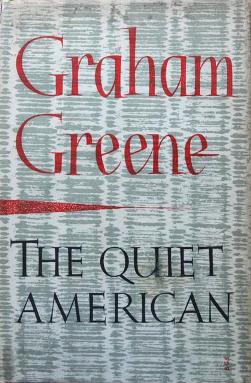A former British spy with leftist political leanings and Catholic convictions, Graham Greene is as an interesting choice as one could fathom to write about the then-brewing trouble in Vietnam. His treatment of the subject was widely attacked as being anti-American, but the truth is that the only agenda displayed here by Greene (or his mouthpiece, Fowler) is one of relentless cynicism. Colonialism, revolution, and the vaunted middle path are all constructed as ideas which, by the end of the day, leave little but failure and bloodshed. Greene was remarkably prescient in that regard.
Remove the political considerations and The Quiet American still stands out as an impressive piece of literature because of Greene’s sharply drawn characters. Fowler at once fills the roles of both narrator and antagonist. It’s an astonishing feat that a story told through the eyes of a selfish, lazy, scheming philanderer remains so compelling, especially given the dearth of likeable characters here. Certainly, one can’t lionize Pyle, whose idealism is equal parts destructive and self-serving, nor can anyone find much to like about the deliberately underdeveloped Phuong or her domineering sister. The closest we get to a hero here is Vigot, the French police inspector who hasn’t let his weariness destroy his sense of duty.
Amid this jumble of misanthropy, Greene finds ample time to take us in-country and explore the geography. From salacious nightclubs to war-torn battle zones, the calamity of 1950s Vietnam is rendered well, if a bit too succinctly at times. A pivotal bombing scene, for example, would have been more effective if we were more fully immersed in the surroundings.
The Quiet American is a direct novel. It gets at the Big Issues of love, war, politics, faith and betrayal without ingenuity or coyness. Some may find this earnestness disarming or mistake the candidness for laziness on the author’s part. But what separates The Quiet American from lackluster political theatre is a very moving human story at the core.
8/10

No comments:
Post a Comment